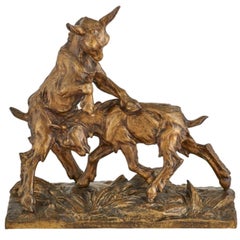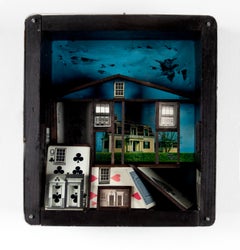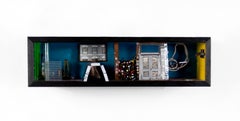Sculptures
1920s Art Deco Sculptures
Bronze
1970s Modern Sculptures
Metal, Copper
1970s Expressionist Sculptures
Bronze
1970s Contemporary Sculptures
Wood, Paper, Mixed Media, Acrylic
1970s Contemporary Sculptures
Wood, Paper, Mixed Media, Acrylic
1970s Modern Sculptures
Slate, Metal, Copper, Steel
1920s Sculptures
Wood
1970s Modern Sculptures
Bronze
1970s Sculptures
Clay
1920s Sculptures
Stone, Bronze
1970s Abstract Geometric Sculptures
Polystyrene, Acrylic
1970s Contemporary Sculptures
Metal
1970s Modern Sculptures
Bronze
1920s Art Deco Sculptures
Bronze
1970s Realist Sculptures
Bronze
1970s Op Art Sculptures
Polystyrene, Wood
1970s Abstract Sculptures
Lucite
1970s Modern Sculptures
Marble
1970s Abstract Geometric Sculptures
Polystyrene, Acrylic
1920s Post-War Sculptures
Wood
1920s Realist Sculptures
Bronze
1970s Abstract Sculptures
Wire
1970s Pop Art Sculptures
Ceramic
1970s Sculptures
Stone
1970s Op Art Sculptures
Porcelain, Glaze
1920s Art Deco Sculptures
Bronze
1920s Art Nouveau Sculptures
Bronze
1970s Modern Sculptures
Wood
1920s Art Deco Sculptures
Bronze
1970s Abstract Sculptures
Terracotta
1920s Art Nouveau Sculptures
Bronze
1970s Abstract Sculptures
Bronze
1970s Realist Sculptures
Bronze
1970s Abstract Sculptures
Bronze
1970s Abstract Sculptures
Terracotta
1920s Art Nouveau Sculptures
Bronze
1920s Art Nouveau Sculptures
Bronze
1920s Art Nouveau Sculptures
Bronze
1970s Abstract Geometric Sculptures
Polystyrene, Acrylic
1970s Sculptures
Porcelain
1970s Sculptures
Porcelain
1970s Sculptures
Porcelain
1970s Sculptures
Porcelain
1970s Sculptures
Porcelain
1970s Sculptures
Porcelain
1970s Sculptures
Porcelain
1970s Sculptures
Porcelain
1970s Sculptures
Porcelain
1970s Abstract Sculptures
Stainless Steel
1970s Contemporary Sculptures
Bronze
1970s Contemporary Sculptures
Steel
1970s Art Deco Sculptures
Bronze
1970s Art Deco Sculptures
Bronze
1970s Art Deco Sculptures
Bronze
1970s Abstract Sculptures
Fiberglass
1970s American Realist Sculptures
Bronze
1970s Op Art Sculptures
Wood, Paint
1970s Op Art Sculptures
Wood, Paint
Nude, Abstract and Figurative Sculptures for Sale
The history of sculpture as we know it is believed to have origins in Ancient Greece, while small sculptural carvings are among the most common examples of prehistoric art. In short, sculpture as a fine art has been with us forever. A powerful three-dimensional means of creative expression, sculpture has long been most frequently associated with religion — consider the limestone Great Sphinx in Giza, Egypt — while the tradition of collecting sculpture, which has also been traced back to Greece as well as to China, far precedes the emergence of museums.
Technique and materials in sculpture have changed over time. Stone sculpture, which essentially began as images carved into cave walls, is as old as human civilization itself. The majority of surviving sculpted works from ancient cultures are stone. Traditionally, this material and pottery as well as metal — bronze in particular — were among the most common materials associated with this field of visual art. Artists have long sought new ways and materials in order to make sculptures and express their ideas. Material, after all, is the vehicle through which artists express themselves, or at least work out the problems knocking around in their heads. It also allows them to push the boundaries of form, subverting our expectations and upending convention. As an influential sculptor as much as he was a revolutionary painter and printmaker, Pablo Picasso worked with everything from wire to wood to bicycle seats.
If you are a lover of art and antiques or are thinking of bringing a work of sculpture into your home for the first time, there are several details to keep in mind. As with all other works of art, think about what you like. What speaks to you? Visit local galleries and museums. Take in works of public art and art fairs when you can and find out what kind of sculpture you like. When you’ve come to a decision about a specific work, try to find out all you can about the piece, and if you’re not buying from a sculptor directly, work with an art expert to confirm the work’s authenticity.
And when you bring your sculpture home, remember: No matter how big or small your new addition is, it will make a statement in your space. Large- and even medium-sized sculptures can be heavy, so hire some professional art handlers as necessary and find a good place in your home for your piece. Whether you’re installing a towering new figurative sculpture — a colorful character by KAWS or hyperreal work by Carole A. Feuerman, perhaps — or an abstract work by Won Lee, you’ll want the sculpture to be safe from being knocked over. (You’ll find that most sculptures should be displayed at eye level, while some large busts look best from below.)
On 1stDibs, find a broad range of exceptional sculptures for sale. Browse works by your favorite creator, style, period or other attribute.
Read More
This Weathered-Steel Sculpture Distills a Form of Protest into a Minimalist Monument
Part of Alejandro Vega Beuvrin’s “Barricada” series, the work is a subversive tribute to the street smarts of citizen activists.
How the Chunky, Funky Ceramics of 5 Mid-Century American Artists Balanced Out Slick Modernism
Get to know the innovators behind the pottery countercultural revolution.
Art Brings the Drama in These Intriguing 1stDibs 50 Spaces
The world’s top designers explain how they display art to elicit the natural (and supernatural) energy of home interiors.
Chryssa’s 1962 Neon Sculpture Was Way ahead of the Art-World Curve
By working with lettering, neon and Pop imagery, Chryssa pioneered several postmodern themes at a time when most male artists detested commercial mediums.
How to Spot a Fake KAWS Figure
KAWS art toys have developed an avid audience in recent decades, and as in any robust collectible market, counterfeiters have followed the mania. Of course, you don’t have to worry about that on 1stDibs, where all our sellers are highly vetted.
A Giant Wedding Cake Has Us Looking at Portuguese Tiles in a New Light
At Waddesdon Manor, artist Joana Vasconcelos has installed a three-tiered patisserie inspired by the narrative tile work of her homeland. We take a look at the cake sculpture and how Portuguese tiles have been used in architecture from the 17th century to today.
These Soft Sculptures Are Childhood Imaginary Friends Come to Life
Miami artist and designer Gabriela Noelle’s fantastical creations appeal to the Peter Pan in all of us.
Hideho Tanaka Carefully Stitched Together Pieces of Paper to Make This Sculptural Textile
The Japanese fiber artist’s ‘Vanishing and Emerging Wall’ may seem innocuous — but it plays with conceptions of time.



